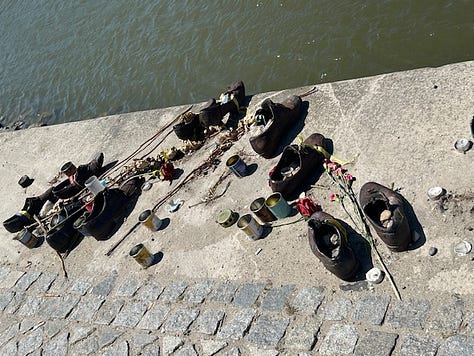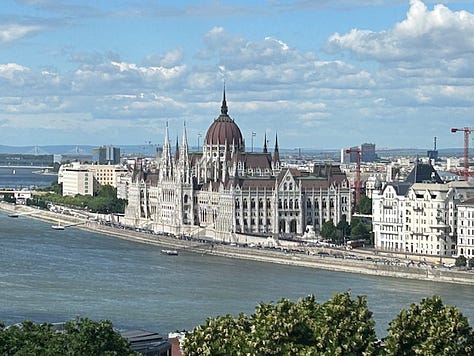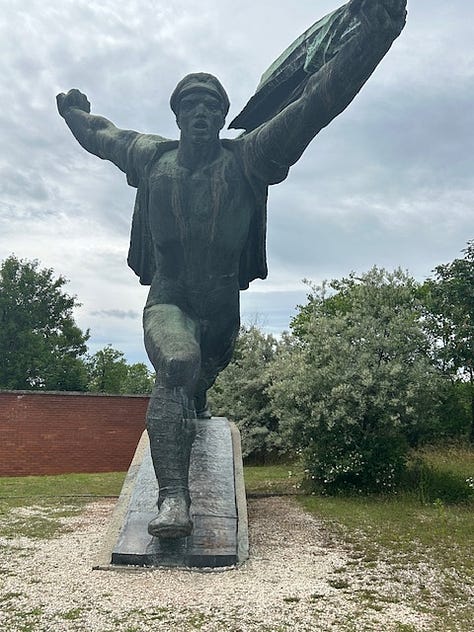Budapest: Revisiting the Past.
Eighteen years on from my first visit, both myself and the city have changed immeasurably.
Parliament rises from the grey-green river like an ornate, spiked wedding cake, icing dripping in gothic sheets and curls. Only metres away, lies the ‘Shoes on the Danube’ memorial, a horrific reminder of the past, when Jewish citizens were lined up along the banks and told to step out of their footwear before they were massacred. Today, the bronze shoe sculptures are filled with flowers and tea-lights. While the brutality remains unforgotten, it sits alongside these expressions of tenderness. You can’t help but imagine the people who might have filled these shoes.
The majestic beauty of this city seems to hide the deep, recent pain of violence and control. Its citizens have somehow managed to retain reminders of this history with grace and sensitivity as they continue to move forward.
I first came here in the winter of 2007, wide-eyed with excitement from my new life in Cairo. Here, I connected the new with the old and met my boyfriend who had remained in the UK.
We were in the dying embers of our relationship and broke up here on Christmas Day. I remember looking down on the ice rink from a hillside while Manu Chao’s Bongo Bong played, the background rhythm forever etched in my memory. I watched the tiny, whirling people, gliding happily over the frozen surface , feeling like my own world was splintering apart.
Perhaps the pain of that moment explains why we got back together for another six months, causing ourselves further misery.
This combination of death and rebirth seems pertinent to Budapest itself. I left after that first visit feeling like there was something magical about the place, which has lived on in my memory ever since.



During that first trip, I visited the rather dramatically named House of Terror museum. It left me stunned, shocked, educated. Due to my own naivety perhaps, I had no real knowledge of life behind the iron curtain. I was aghast that Hungary had only been free from Soviet rule since the early 1990s, when I was in the early years of secondary school taking my political and personal freedom entirely for granted. The museum has stayed with me in the intervening decades. I remember feeling that it was so sensitively created. Without shrinking from the truth and without gratuity, it presented the horrors of what happened during both World War II and the decades afterwards.
I returned to the museum a few days ago, an older version of myself with greater knowledge and experience of the world. Although I still found the place deeply informative and moving, it was difficult to hear the audio guide over the videos in the exhibition and the dramatic music that played in most of the rooms struck me as unnecessary and unsubtle. The truth of history can speak for itself - it doesn’t need emphasising. I will never know whether the museum is different, or I am different - no doubt, a combination of the two. Leaving it, I felt a profound sense of loss. Over my original memory, is layered this new more critical, less impactful one. Yet perhaps this is also a gain of sorts.
When Soviet rule finally ended in 1991, enormous statues were left across the city, originally placed there to remind citizens of their ‘liberation’. I remain moved by the fact that rather than destroy them all, a decision was made to rehouse some of these monuments of propaganda to an open air museum outside of town, a testament to what the nation has endured.
The aptly named Memento Park is small and feels almost like a quiet retreat from the bustling city. Stalin’s boots sit across from the main entrance. The rest of him was sawn off at the knees and pulled down during the 1956 revolution. I smile at this thought.
The guide on our walking tour points out Lady Liberty at the top of the hill by the citadel. Rather than being removed, she was covered by a sheet after the Soviets left and unveiled with her new persona in what seems to me a thrilling reclamation and reinterpretation of a past symbol.
I wonder what the future holds for this country. I ask our guide what she thinks of Orban’s policy exempting women who have two or more children from paying income tax. She is positive about the policy and thinks it will mean that women won’t have to choose between motherhood and their careers. She doesn’t know if it will increase the birth rate yet, but hopes it will. I try to banish echoes of The Handmaid’s Tale from my mind.
We are told about the high rate of tax but also how it covers all health and dental care and how university is free - you can train in one profession and not have to pay fees. It sounds idyllic as I think about my own lack of a dentist and student fees. Yet, I know there are many deeply worrying issues occurring here. I refrain from asking about the Pride ban, the removal of rights for LGBTQ people, the ‘redistribution’ of state resources and the rhetoric on immigration, (all of which also seem to be reflected in so many other nations at the moment). I wonder how easy it is here to speak freely about politics.



One place we don’t re-visit on our trip is the labyrinth under the foundations of Buda Castle. We roam the Royal Palace, built on top of the walls and stare at the view across the river. My memories of the labyrinth are precious and seem to be bathed in an orange glow. I remember wandering around the dim chambers, looking at statues and feeling like I had somehow entered another world that crossed time. Ultimately, we don’t revisit it and I am glad of this. I retain this memory, soft-edged and no doubt inaccurate but also offering a sense of magic and allowing me to retain some of the wonder I first felt at this enchanting city.
We leave at 4am. Standing in the street, waiting for the minibus, we are surrounded by gangs of predominantly young men, queueing up at the kebab counter. Some swig beer from plastic glasses. A rickshaw whizzes past, blaring out music. I close my eyes briefly, trying to exchange this modern street for an image of serenity. I try to conjure up the skyline of Buda from the banks of the Pest riverside, domed and peaked. I imagine the Danube flowing, majestic and completely impervious to the existence of humankind.
The minibus arrives, engine thrumming and doors whizzing open, as behind me someone drops a kebab. The beat from the rickshaw drums from the next street as dawn begins to break over the city.



